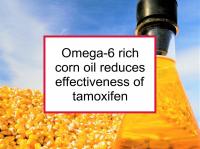A new study recently presented at the annual American Association for Cancer Research (AACR) Meeting in Washington, D.C. has reported that an omega-6 fatty acid-rich diet could make tumors treated with tamoxifen more prone to aggressive behavior or result in tamoxifen resistance.
It previously has been reported an omega-3-rich diet can strengthen the inhibitory effect of tamoxifen on the development of estrogen-dependent breast cancer.
However, the mechanism of action has not been adequately explained. In the study, Sprague Dawley rats were administered a carcinogen to induce mammary tumors and divided into four groups (G1 to G4). Each group was given a standard diet, modified as follows: G1 received 20% corn oil; G2 received a diet with 17% fish oil and 3% corn oil; G3 received the corn oil diet plus tamoxifen; and G4 received the fish oil diet plus tamoxifen. Tamoxifen was administered five days per week to groups G3 and G4. After eight weeks, the animals were sacrificed and their mammary tumors were removed to assess genetic changes.
The Tamoxifen-treated groups (G3: corn oil plus tamoxifen, and G4: fish oil plus tamoxifen) were compared with their respective controls (G1: corn oil and G2: fish oil). A total of 125 genes differentially expressed in the G3/G1 comparison and 58 in the G4/G2 comparison were related to cancer, apoptosis, cellular migration, cellular proliferation, inflammatory response or angiogenesis. The expression pattern of genes related to cell proliferation and apoptosis was found to be divergent in the G3 /G1 (corn oil) comparison, as was the expression pattern of genes related to proliferation (but not apoptosis) in the G4/G2 (fish oil) comparison.
Corn oil treatment in the presence of tamoxifen was found to influence genes in a manner indicating an inflammatory host response. These changes were accompanied by upregulation genes which control angiogenesis and cell migration, and which can lead to metastasis. These cancer-promoting changes were not observed in the fish oil and tamoxifen treated group. The authors conclude that a diet rich in omega-6 fats could modify the genomic profile of tamoxifen treated tumors, making them more prone to aggressive behavior or resulting in tamoxifen resistance.
